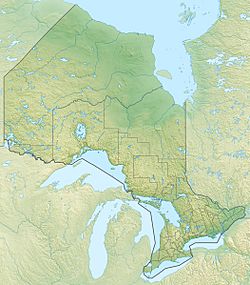North Wejinabikun Lake (Ontario) facts for kids
Quick facts for kids North Wejinabikun Lake |
|
|---|---|
| Location | Algoma District, Ontario |
| Coordinates | 48°42′16″N 84°34′58″W / 48.70444°N 84.58278°W |
| Primary inflows | Magpie River |
| Primary outflows | Magpie River |
| Basin countries | Canada |
| Max. length | 1.5 km (0.93 mi) |
| Max. width | 0.7 km (0.43 mi) |
| Surface elevation | 358 m (1,175 ft) |
North Wejinabikun Lake is a beautiful lake located in the Algoma District of Ontario, Canada. It's an important part of the huge Lake Superior drainage basin. This means its waters eventually flow into one of the world's largest freshwater lakes!
The lake is about 1.5 kilometers (about 1 mile) long and 0.7 kilometers (about half a mile) wide. It sits at an elevation of 358 meters (1,175 feet) above sea level.
Contents
Discovering North Wejinabikun Lake
North Wejinabikun Lake is found in a wild and natural area of Ontario. The Algoma District is known for its vast forests, many lakes, and winding rivers. This makes the lake a peaceful spot, surrounded by nature.
The Magpie River Connection
The main river flowing into North Wejinabikun Lake is the Magpie River. This river brings water from another nearby lake called Wejinabikun Lake. The Magpie River also flows out of North Wejinabikun Lake. It continues its journey downstream towards Mosambik Lake. Eventually, all this water makes its way to the mighty Lake Superior. This shows how all these lakes and rivers are connected!
What is a Drainage Basin?
A drainage basin is like a giant funnel. It's an area of land where all the water, from rain or melting snow, drains into a common body of water. For North Wejinabikun Lake, it's part of the Lake Superior drainage basin. This means all the water from this lake, and many others, eventually ends up in Lake Superior.
Nature Around the Lake
Lakes like North Wejinabikun Lake are important for local wildlife. The surrounding forests and waters provide homes for many animals. You might find different types of fish in the lake. The nearby forests are home to birds, deer, and other creatures.
Protecting Our Lakes
It's important to protect lakes like North Wejinabikun Lake. Keeping the water clean helps the fish and other animals that live there. It also helps keep the natural beauty of the area. People who visit these lakes often enjoy fishing, canoeing, or simply watching nature.
 | Isaac Myers |
 | D. Hamilton Jackson |
 | A. Philip Randolph |


